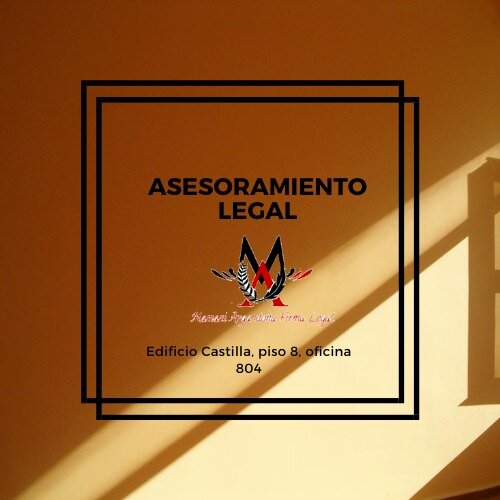Best Tax Lawyers in Bolivia
Share your needs with us, get contacted by law firms.
Free. Takes 2 min.
Or refine your search by selecting a city:
List of the best lawyers in Bolivia
About Tax Law in Bolivia
Tax law in Bolivia is largely governed by the Bolivian Tax Code and various decrees and instructions issued by the National Tax Service (Servicio de Impuestos Nacionales, SIN). The tax system is predominantly based on income, consumption, and property taxation, with Value Added Tax (VAT), Corporate Income Tax, and Personal Income Tax being significant components. Over the years, Bolivia has made efforts to improve tax compliance, enhance transparency, and streamline the tax collection process. It's important for individuals and businesses operating in Bolivia to understand these tax obligations to ensure compliance and avoid penalties.
Why You May Need a Lawyer
Engaging a tax lawyer in Bolivia can be crucial in several situations, including:
- Filing complex tax returns and ensuring compliance with both local and international tax obligations.
- Dealing with audits or investigations conducted by the National Tax Service.
- Negotiating tax debts and understanding amnesty programs or payment plans.
- Seeking advice on tax planning and optimization to minimize liabilities.
- Addressing legal disputes or litigation related to tax matters.
- Understanding the implications of tax legislation changes for personal or business finances.
Local Laws Overview
Key aspects of Bolivian tax law include the following:
- Value Added Tax (VAT): VAT in Bolivia is levied at a rate of 13% on the sale of goods and services. Certain transactions may be exempt or subject to reduced rates.
- Corporate Income Tax: The standard rate is 25% on the net taxable income of corporations. There are additional taxes for banking and financial institutions.
- Personal Income Tax: Individuals are subject to taxes on their worldwide income, with rates ranging from 0% to 13%, depending on income levels.
- Transaction Tax: A 3% transaction tax applies to sales of specific goods and real estate.
- Special Taxes: There are taxes on imports, hydrocarbons, and specific sectors like mining or telecommunications.
Frequently Asked Questions
What is the deadline for filing tax returns in Bolivia?
The fiscal year in Bolivia follows the calendar year. Tax returns are generally due by the end of March of the following year. However, specific filing deadlines can vary depending on the type of tax and the taxpayer's classification.
Are there any penalties for late filing or non-payment of taxes?
Yes, the Bolivian Tax Code imposes penalties for late filing and non-payment, including fines and interest on overdue payments. The severity of penalties may depend on the circumstances, such as whether the delay was intentional or caused by unforeseen circumstances.
How can I reduce my tax liabilities in Bolivia?
Tax planning and seeking legal advice can help identify potential deductions, exemptions, and credits. Engaging with a tax professional can also ensure that tax strategies comply with current laws and regulations.
Are there any tax incentives for businesses in Bolivia?
Yes, Bolivia offers several tax incentives for investments in certain sectors, such as renewable energy, tourism, and agriculture. These can include tax holidays, reduced rates, and investment allowances.
What records must I keep for tax purposes?
Taxpayers in Bolivia must keep accurate records of financial transactions, including invoices, receipts, and bank statements. These records should be kept for a period of up to eight years.
Can foreign citizens be taxed in Bolivia?
Yes, foreign citizens residing or earning income in Bolivia may be subject to Bolivian taxes on their income sourced within the country. Tax treaties may affect this obligation.
What should I do if I receive a tax audit notice?
It's advisable to contact a tax lawyer or accountant to review your situation. Ensure that all necessary documents are organized, and be prepared to address any inquiries from the tax authorities.
How can I appeal a tax assessment in Bolivia?
Appeals can be filed with the tax authorities, and there’s often a limited timeframe to do so. Legal guidance is recommended to ensure proper procedures are followed.
Is e-filing available in Bolivia?
Yes, the National Tax Service provides an online platform for certain tax filings. E-filing can be a convenient option for efficient and timely submissions.
Do I need to pay taxes on international income?
Residents of Bolivia are subject to taxes on their worldwide income, although tax treaties between Bolivia and other countries may provide relief or credits to avoid double taxation.
Additional Resources
The following entities can offer assistance and information on tax-related matters in Bolivia:
- National Tax Service (Servicio de Impuestos Nacionales, SIN): This is the primary body overseeing tax policies and enforcement.
- Financial Services Authority (Autoridad de Supervisión del Sistema Financiero, ASFI): Provides oversight and regulation of financial institutions, including those offering tax services.
- Bolivian Customs (Aduana Nacional de Bolivia): Manages import and export taxation issues.
- Bolivian Institute of Tax Services (Instituto Boliviano de Impuestos): Offers education and resources on tax compliance and policies.
Next Steps
If you need legal assistance with tax matters in Bolivia, consider the following steps:
- Consult a Professional: Engage with a certified tax lawyer or accountant familiar with Bolivian tax laws.
- Prepare Documentation: Assemble relevant financial documents and records for review by your legal advisor.
- Explore Legal Options: Discuss potential strategies and solutions with your advisor to address your specific tax needs.
- Inquire About Costs: Get a clear understanding of the potential legal fees and expenses involved.
- Stay Informed: Keep up to date with any changes in Bolivian tax laws that might affect your situation.
Lawzana helps you find the best lawyers and law firms in Bolivia through a curated and pre-screened list of qualified legal professionals. Our platform offers rankings and detailed profiles of attorneys and law firms, allowing you to compare based on practice areas, including Tax, experience, and client feedback.
Each profile includes a description of the firm's areas of practice, client reviews, team members and partners, year of establishment, spoken languages, office locations, contact information, social media presence, and any published articles or resources. Most firms on our platform speak English and are experienced in both local and international legal matters.
Get a quote from top-rated law firms in Bolivia — quickly, securely, and without unnecessary hassle.
Disclaimer:
The information provided on this page is for general informational purposes only and does not constitute legal advice. While we strive to ensure the accuracy and relevance of the content, legal information may change over time, and interpretations of the law can vary. You should always consult with a qualified legal professional for advice specific to your situation.
We disclaim all liability for actions taken or not taken based on the content of this page. If you believe any information is incorrect or outdated, please contact us, and we will review and update it where appropriate.
Browse tax law firms by city in Bolivia
Refine your search by selecting a city.
















